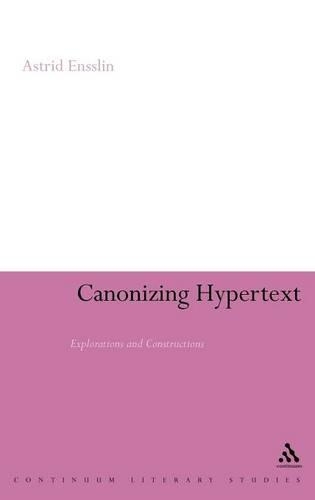
Canonizing Hypertext: Explorations and Constructions
(Hardback)
Publishing Details
Canonizing Hypertext: Explorations and Constructions
By (Author) Professor Astrid Ensslin
Bloomsbury Publishing PLC
Continuum International Publishing Group Ltd.
9th May 2007
United Kingdom
Classifications
Professional and Scholarly
Non Fiction
Web programming
Language teaching theory and methods
809.93360028567
Physical Properties
Hardback
206
Width 156mm, Height 234mm
300g
Description
This innovative monograph focuses on a contemporary form of computer-based literature called 'literary hypertext', a digital, interactive, communicative form of new media writing. Canonizing Hypertext combines theoretical and hermeneutic investigations with empirical research into the motivational and pedagogic possibilities of this form of literature. It focuses on key questions for literary scholars and teachers: How can literature be taught in such a way as to make it relevant for an increasingly hypermedia-oriented readership How can the rapidly evolving new media be integrated into curricula that still seek to transmit traditional' literary competence How can the notion of literary competence be broadened to take into account these current trends This study, which argues for hypertext's integration in the literary canon, offers a critical overview of developments in hypertext theory, an exemplary hypertext canon and an evaluation of possible classroom applications.
Reviews
'...in the absence of any hypertext in the canon of English Literature,[Ensslin] is forced to propose her own. These turn out to be the fairly well-known Michael Joyce (afternoon), Stuart Moulthorpe (Victory Garden) and Jayne Yellowlees Douglas (I Have Said Nothing). These are the 'first generation' of hypertext writers. There are 'plot summaries' so far as this is possible with non-sequential writing, yet even whilst making great claims for their work, she is curiously reluctant to quote from them to prove that these qualities exist...Nevertheless, for anyone interested in the subject of electronic writing, hypertext, or experimental narratives, I think it's worth grappling with the difficulties to get an up-to-date view on the issues.' Roy Johnson, 2007, Mantex.co.uk
The book is highly recommended to scholars, instructors, and students of literature, but will be food for thought for all researchers interested in (hyper)media criticism as well' Reviewed in Discourse and Society, December 2009
Reviewed in Journal of Sociolinguistics, 2008 (UK) A very interesting and useful book by an author with an impressive command of a range of academics fields'
Author Bio
Astrid Ensslin is Professor of Dynamics of Virtual Communication Spaces at University of Regensburg, Germany.
